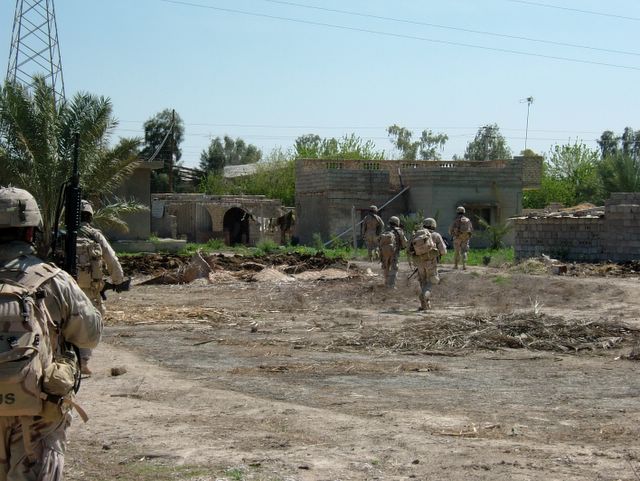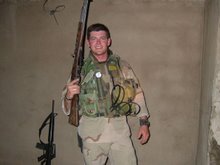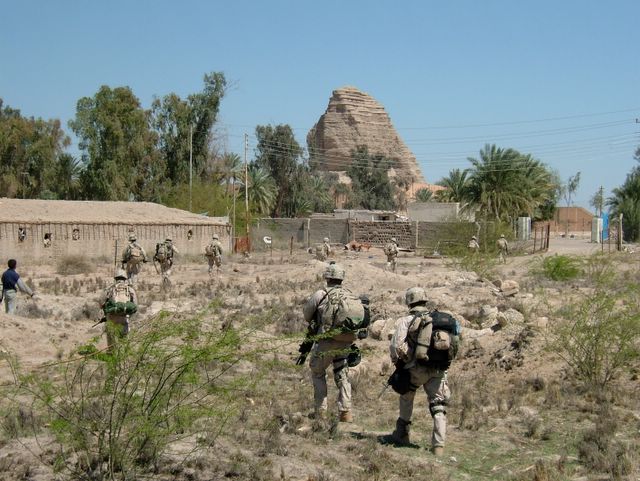Top U.S. military officer assails Iran's role in Iraq
International Herald Tribune
By David Stout
Friday, April 25, 2008
WASHINGTON: The government of Iran continues to supply weapons and other support to extremists in Iraq, despite repeated promises to the contrary, and is increasingly complicit in the death of U.S. soldiers, the chairman of the Joint Chiefs of Staff said Friday in a stark new assessment of Iranian influence.
The chairman, Admiral Michael Mullen, said he was "extremely concerned" about "the increasingly lethal and malign influence" by the government of Iran and the Quds Force of Iran's Revolutionary Guards, a special force that aids and encourages Islamic militants around the world. The Quds Forces in Iran were created during the Iran-Iraq war in the 1980s and report directly to the leadership of Iran's theocratic government.
Pentagon concerns about Iranian influence in neighboring Iraq is nothing new, but the content and tone of Mullen's remarks left the impression that far from abating, the worries about Iran have intensified in recent months.
"The Iranian government pledged to halt such activities some months ago," Mullen said. "It's plainly obvious they have not. Indeed, they seem to have gone the other way."
The discovery of weapons caches in Iraq, with devices bearing stamps that indicate they were manufactured quite recently, run contrary to the Iranian promises not to interfere in Iraq, the admiral said. He conceded that he had "no smoking gun" to prove direct involvement by the very highest echelons in Tehran, but he said he found it hard to believe that all the top leaders were ignorant of recent developments.
The Pentagon is sufficiently concerned about Iran's apparently deepening involvement in Iraq that it plans a briefing in the near future by General David Petraeus, the U.S. commander in Iraq, to publicize the caches of weapons, some of which are believed to have been used against U.S. troops in the recent fighting in Basra, in southern Iraq. Details of the weapons and the Pentagon's concerns over them were disclosed Friday in The Wall Street Journal.
"I believe recent events, especially the Basra operation, have revealed just how much and just how far Iran is reaching into Iraq to foment instability," Mullen said.
Of particular concern to U.S. military commanders are explosively formed penetrators, or EFPs, which the Pentagon says are being made in Iran and shipped to Shiite militants in Iraq, where they are used to deadly effect against U.S. forces trying to subdue extremist elements and bolster the government of Prime Minister Nuri Kamal al-Maliki.
Asked whether the new evidence of Iranian mischief in Iraq portends an U.S. military conflict with Iran, the admiral said, "I'm not going to add anything to what I've already said in that regard." For now, Mullen said, the best weapon against Iran is a combination of diplomatic and financial pressure by the United States and other nations alarmed by Iran's attitude.
Pentagon leaders have said they would not rule out military action against Iran. But it is not uncommon for U.S. civilian and military leaders to leave "all options on the table," in an often-used phrase, because to rule out military action in advance is seen as admitting a lack of resolve.
Mullen acknowledged that the U.S. military was being stretched thin by the operations in Iraq and Afghanistan. But, he said, "it would be a mistake to think that we are out of combat capability." As for Iranian motives, Mullen said he believed the leadership in Tehran hopes for a weak Iraq, so that Iran can increase its influence in the region.
Moreover, deep resentment remains in Iran toward the United States, which until the Iranian revolution in 1979 long supported the repressive regime of Shah Mohammad Reza Pahlavi as a bulwark against Soviet influence in the Cold War. The current Iranian president, Mahmoud Ahmadinejad, has shown little indication of wanting better relations with Washington.
Mullen said Iranian influence in Iraq goes beyond shipment of weapons. "They continue to train Iraqis in Iran to come back and fight Americans and the coalition," he said. Reiterating earlier accusations, he asserted that Iranian leaders "continue to broadly support terrorists in other parts of the region," including the militant groups Hezbollah and Hamas.
"And in fact, we're seeing some evidence that they're supporting the Taliban in Afghanistan," Mullen said.
Thom Shanker contributed reporting.












